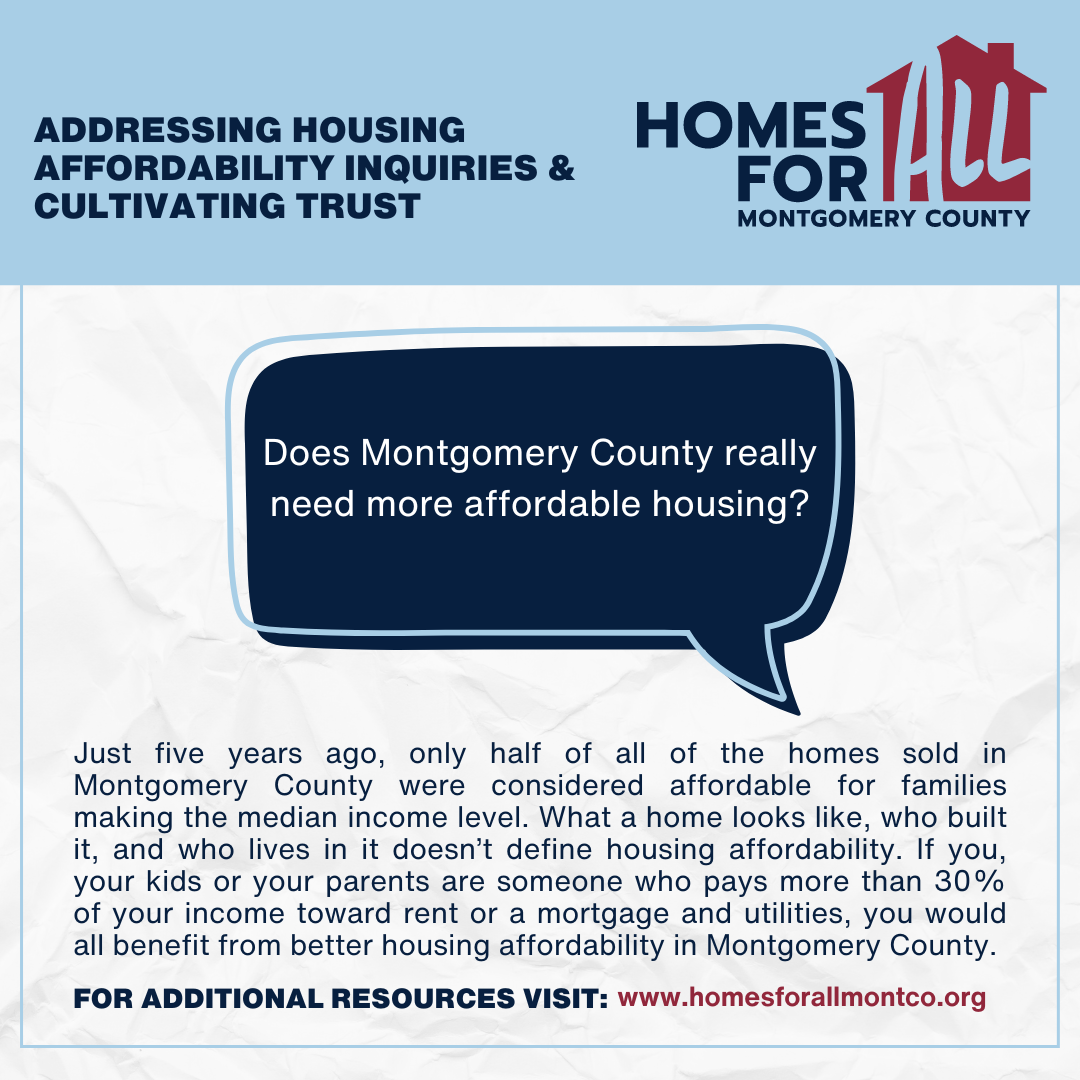Housing Professionals

In Montgomery County, the cost of housing has skyrocketed, making it increasingly unattainable for many residents. To illustrate this, consider that between 2022 and 2023, the median housing sale price surged by $25,000. For those not actively seeking a home, comprehending this drastic uptick in housing prices can be challenging.
For instance, let's take the case of a 2-bedroom apartment: To avoid excessive rent burden, an individual would need to work either 52 hours a week at a minimum wage of $18.75 per hour, or 40 hours a week at $24 per hour, based on a fair market rate rental of $1,266 per month. However, the current average rate for a 2-bedroom apartment in Montgomery County stands at $1,855, significantly surpassing the fair market rate.
This significant disparity means that a substantial portion of Montgomery County residents are spending more than 30% of their income on housing costs, leaving them financially strained and vulnerable. With housing expenses consuming such a large share of their income, individuals and families are forced to make sacrifices in other essential areas, such as healthcare, education, or savings for the future.
The urgent need for more affordable housing options in Montgomery County cannot be overstated. Without access to housing that aligns with their income levels, many residents face constant threats of housing instability, eviction, or homelessness. Addressing this pressing issue requires collaborative efforts from both the public and private sectors to increase the availability of affordable housing options and ensure that all residents have access to safe, decent, and affordable homes. With an increased need for accessible and affordable housing solutions, many are seeking guidance on how to navigate these challenges. In response, Homes for All is proud to introduce our Affordable Housing Toolkit – a comprehensive resource designed to provide timely, effective, and consistent information to support individuals and communities in making informed decisions about affordable housing options. Explore the toolkit to empower yourself and others in ensuring safe and affordable homes for everyone.
As housing professionals you can use these strategies to amplify the Homes For All message and combat misinformation and discriminatory opinions.
- Offer to hold informational events with municipal officials present to share information about proposed new housing construction
- Respond to misinformation with the facts and point neighbors to the source of truth.
- Speak out about your support of addressing housing affordability in Montgomery County and creating more high-quality, affordable homes in their communities.
- Share positive stories about how your clients or tenants have been helped by the work you do. This can help provide a human face to what can otherwise be hard to see and understand
Sample Social Media Posts:

Sample Social Media Caption:
Foster awareness about the benefits of housing affordability within the community, dispelling myths, and building support for inclusive housing initiatives. Connection statements serve as an essential communication tool to remain focused on key messages and establish trust through evidence-based information.
Combat Misinformation:
For housing professionals, facilitating thriving and vibrant communities involves addressing the needs of individuals who face challenges in finding suitable housing. It's essential to provide high-quality homes that cater to diverse needs, especially for those who may struggle to find residences that meet their requirements or who cannot easily live independently.
When envisioning the communities we aspire to build, we prioritize safety, cleanliness, walkability, and comfort. Achieving this vision requires identifying and overcoming barriers, such as the impact of location and proximity to essential amenities and job opportunities. Additionally, we must recognize external factors that contribute to stress and diminish quality of life, which often lie beyond individual control.
Consider a family that can only afford housing in a location lacking essential services and economic opportunities. In such circumstances, it's unrealistic to expect them to thrive. The location of a home and the supporting infrastructure significantly influence a family's well-being, exerting more influence than their individual actions.
As housing professionals, it's our responsibility to address these challenges and ensure that all individuals have access to high-quality homes that contribute to their overall well-being and enable them to live fulfilling lives within vibrant communities.
What's Next:
Moving forward, our focus is on ensuring the success of proposed changes to the community through a collaborative and equitable approach. This involves actively engaging all stakeholders in the decision-making process, with careful consideration given to those currently involved and those potentially underrepresented. Effective communication and combatting misinformation are essential components of this approach. By fostering open dialogue, addressing concerns, and providing accurate information, we can build trust and understanding among all stakeholders, ultimately leading to informed decisions and successful outcomes for the community.


